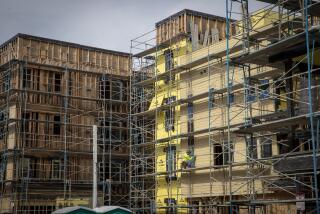Determining whether condo building’s access for disabled is up to code
- Share via
Question: How would I find out whether our condo building is up to code regarding wheelchair accessibility? I talked to our homeowners association board and they told me it would cost too much money to add wheelchair ramps, so forget it. I have made phone calls to code enforcement, and each leads to a dead end. Presently there are several units that would benefit from ramps. Where do I start?
Answer: To learn whether your common interest development and the condo building are up to code, you should be able to acquire a set of the building plans and approvals from your city or county’s building department. Those plans should show a Certificate of Occupancy signed off and issued, meaning the project met the existing code requirements. To make any changes in the complex, whether or not they pertain to accommodations or accessibility, requires a valid permit, which will be only be issued if the work is up to the present-day building code. The association could be responsible for complying with the present-day building code requirements at association expense.
Of course, “association expense” means that all the owners pay for the required changes. But that does not mean that individual titleholders are prevented from making whatever modifications may be necessary to their own units, homes or properties. Accommodation changes could even be made to common areas for the purpose of facilitating access, but those modifications may have to be removed when they are no longer needed or when the unit is sold.
Civil Code section 1360 permits an owner, at his own expense, to make any changes necessary to permit access for handicapped, disabled and/or physically challenged people, provided the accommodations conform to current building codes and standards, and the association’s governing documents.
Check the association’s covenants, conditions and restrictions for responsibility and potential liability pertaining to such modifications to an owner’s property. The association can undertake to make modifications to common-area curbs and other such areas for easier access. Should an assessment for such modifications be necessary, a vote of the homeowners might be required before the changes could be made. That would mean that all titleholders would be responsible for paying for those changes.
Whether your association complies with state or federal disability access laws depends on a variety of factors, all of which your board will find through its due diligence. If compliance is mandatory, the association must comply.
Send questions to P.O. Box 10490, Marina del Rey, CA 90295 or e-mail noexit@mindspring.com.
More to Read
Inside the business of entertainment
The Wide Shot brings you news, analysis and insights on everything from streaming wars to production — and what it all means for the future.
You may occasionally receive promotional content from the Los Angeles Times.








